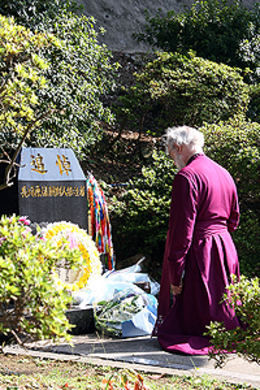Archbishop of Canterbury backs efforts for a world free of nuclear arms
 The Archbishop lays flowers at a memorial in Nagasaki
The Archbishop lays flowers at a memorial in NagasakiThursday 24th September 2009
The Archbishop of Canterbury, Dr Rowan Williams, currently visiting the Anglican Church in Japan, today took part in an Act of Remembrance at the epicentre of the atomic bomb blast in Nagasaki. During the Act of Remembrance, Dr Williams laid flowers at the memorial and spoke about the pressing importance of working for a world free from nuclear weapons."There are no victories in human history without their element of tragedy. Victory in human affairs always means that someone has lost ...sometimes the victory has been gained at the price of such violence that we have to say that everyone has lost. Those who have won the conflict have lost some dimension of their own life, their own welfare and integrity."
"To see the effects of the use of the atomic bomb here in Nagasaki is to see how this degree of slaughter and violence leaves everyone defeated. The wholesale killing of the innocent and the destruction of an entire environment, natural as well as cultural, the long-term effects, physical and psychological, on those who survived – all of this constitutes a wound that affects the attackers as well as the victims."
"The Catholic writer Ronald Knox, commenting in 1945 upon the events that took place in August that year, said that the bomb was an attack on faith, hope and love – an attack on the central virtues of Christian existence."
"That attack will continue so long as weapons of mass destruction like nuclear armaments are used as threats in international conflict. They are necessarily indiscriminate; that is, they will always kill the innocent. They destroy the living environment; they have long-term effects on every aspect of the material and organic world. To plan a strategy around such weapons is to be defeated by them. To threaten such an outrage against humanity and its world is to begin to lose one's moral and human dignity."
"To work for a world free from nuclear arms is to work for the sake of that moral and human dignity."
"It is tempting to think that the task is too difficult. Once we have discovered this destructive technology, we cannot pretend it does not exist. Yet equally we cannot – if we are serious about our human dignity – behave as though we had no choice ..... However precisely we seek to make real the hope of a world without nuclear arms, we should not lose sight of the need to make real moral choices about them. Even a small step is an act of witness."
The Archbishop also paid a visit to the memorial to the 26 Christian martyrs who were crucified in 1549. Dr Williams offered prayers alongside the Most Revd Joseph Mitsuaki Takami, the Roman Catholic Archbishop of Nagasaki.
Notes to editors:
The Twenty-six Martyrs of Japan refers to a group of Christians who were executed by crucifixion on February 5th, 1597 at Nagasaki.
On August 15, 1549, St. Francis Xavier (later canonized by Gregory XV in 1622), Fr. Cosne de Torres, S.J. (a Jesuit priesy), and Fr. John Fernandez arrived in Kagoshima, Japan, from Spain with hopes of bringing Catholicism to Japan. On September 29, St. Francis Xavier visited Shimazu Takahisa, the daimy of Kagoshima, asking for permission to build the first Catholic mission in Japan. The daimyo agreed in hopes of creating a trade relationship with Europe.
A promising beginning to those missions—perhaps as many as 300,000 Christians by the end of the sixteenth century—met complications from competition between the missionary groups, political difficulty between Spain and Portugal, and factions within the government of Japan. Christianity was suppressed. By 1630, Christianity was driven underground.
The first Martyrs of Japan were canonized in 1862. They are commemorated on February 5th when, on that date in 1597, twenty-six missionaries and converts were killed by crucifixion. Two hundred and fifty years later, when Christian missionaries returned to Japan, they found a community of Japanese Christians that had survived underground.
